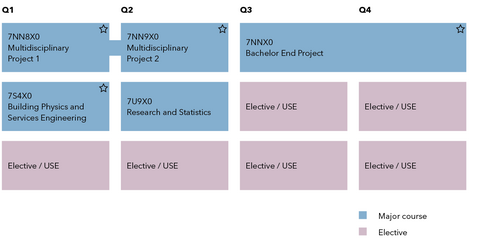Program year 3
In the last year of AUBS you will start preparing for one of our master programs. This means starting with your specialization into one of the subjects within the BAU-profiles. There are two major projects in year 3: the Multi-project and the Bachelor End Project (BEP). You will also follow the remaining part of your electives and/or USE-trajectory.
Below is an overview of the program for year 3:

All courses are worth 5 ECTS.
All courses with a ☆, have integrated professional skills.
Electives / USE
You can find an overview of our coherent packages (electives) at the bottom of this page, under downloads. All USE-trajectories are listed here.
Within the space for electives (last year 4 courses, this year 6 courses), you have to complete 2 elective packages and 1 USE-trajectory.
Pay attention to the planning of your elective space, like every course, electives and USE-courses have their own timeslots. Make sure you have no overlap using the TU/e PlanApp.
Multi-project
The Multi-project is the perfect chance to test yourself in one of the professional roles of the Built Environment, from architect/urbanist to structural designer, building physicist and project developer. In a team built up out of all these roles, you will work on a large realistic project.
Bachelor End Project (BEP)
The BEP is the last project within the bachelor projects line of AUBS. This is the time to show what you're worth and find out which master specialization fits your interests and ambitions.
When it comes to choosing your BEP, you have two options: you can either choose to do a BEP offered by one of the disciplines of the Built Environment, or you can choose to do the BEP in the Innovation Space (ISBEP).
You may start your BEP if you meet these requirements:
-
You have obtained at least 120 credits,
-
including the compulsory study components of the first year of the Bachelor’s program, all projects of the second year and all Multi projects.
-
For more information, check the PER.
BEP by one of the disciplines of Built Environment
The bachelor end project offered by the Built Environment is the individual closure of your bachelor program in which you show that you are able to execute a design or research project independently with limited supervision. Although groupwork might be part of your BEP, the assessment is individual.
The BEP offered by the built environment takes 2 quartiles and is worth 10 ECTS.
There are various bachelor end projects for the different specializations:
| Additional information | ||
|---|---|---|
| 7AUX0* | AUDE 1 | Urbanism & Architecture 'Interventions in the City' |
| 7AUX0* | AUDE 2 | Architecture 'Design of a building' |
| 7BPX0 | BPS | |
| 7SDX0* | SED 1 | Functional and structural research and design |
| 7SDX0* | SED 2 | Generative and parametric design |
| 7USRX0 | USRE |
* Some units offer multiple BEP projects with the same course code. Register for one specific project via OSIRIS.
Tip: before the BEP starts, take some time to study the assessment form and discuss any questions with your teacher so that you know what is expected of you. The assessment forms can be found under 'Downloads' at the bottom of this page.
BEP Innovation Space (ISBEP)
The ISBEP offers students from all departments the opportunity to close their bachelor program by working in interdisciplinary teams with fellow students on real world problems. These problems are offered by companies, student teams, the university itself, or you could even propose your own challenge.
Students Groupwork is inherent to the ISBEP, but the assessment of students taking the ISBEP is done individually by TU/e staff from their own department.
The ISBEP offered by the Innovation space takes 2 quartiles and is worth 10 + 5 ECTS (divided over 2 course codes: ISBEP05 and 7ISBX0).
To learn more about the ISBEP, its specifications, requirements and available challenges, please visit the ISBEP Educationguide page.
Downloads
-
[pdf] Student Guide AUBS year 3 (2024-2025)
6 MB -
[pdf] Program AUBS year 3 (2024-2025)
224 KB -
[pdf] Coherent elective packages (2024-2025)
223 KB -
[pdf] Assessment form BEP AUDE.pdf
354 KB -
[pdf] Assessment form BEP BPS.pdf
335 KB -
[pdf] Assessment form BEP SED.pdf
331 KB -
[pdf] Assessment form BEP USRE.pdf
302 KB
More information
Want to know more? Contact us via the contact form below.